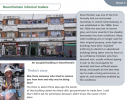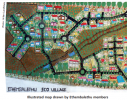Land Library
Welcome to the Land Portal Library. Explore our vast collection of open-access resources (over 74,000) including reports, journal articles, research papers, peer-reviewed publications, legal documents, videos and much more.
/ library resources
Showing items 1 through 9 of 24.This case study draws on research that investigated how urban land is claimed, used or divided and the various land use management (LUM) practices that exist around these various and sometimes competing land uses.
This case study draws on research that sought to understand the process of urban land development in practice, from the perspectives of developers and municipalities.
This case study is based on research undertaken into the experiences of a poor community in accessing land through formal channels in peri-urban South Africa. The research was conducted by a team of researchers pulled together by the World Bank.
This case study draws on research that investigated how people access, trade and hold land in poorer and less formal parts of three metropolitan areas.
This case study examines specific examples of localised and informal land registration practices in South Africa.
This case study draws on research into some of the processes through which people access, hold, and trade land in poorer areas of towns and cities.
This case study draws on research that investigated the perspectives and experiences of civil society organisations with regard to access to urban land by the poor. The research was conducted by Warren Smit, commissioned by Urban LandMark. An introduction to the case study is given below.
Evictions and resettlement processes have become major issues of concern in Cambodia, with serious consequences for the lives and well-being of individuals and communities. This booklet contains two key United Nations documents that specifically address these issues.
A book documenting stories of people affected by forced evictions in Cambodia. The personal stories show what is lost when a home is destroyed or livelihood disrupted; and how people living in poverty are routinely excluded from decisions affecting them.







